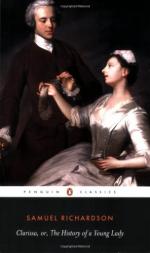The length of the piece has been objected to by some, who perhaps looked upon it as a mere novel or romance; and yet of these there are not wanting works of equal length.
They were of opinion, that the story moved too slowly, particularly in the first and second volumes, which are chiefly taken up with the altercations between Clarissa and the several persons of her family.
But is it not true, that those altercations are the foundation of the whole, and therefore a necessary part of the work? The letters and conversations, where the story makes the slowest progress, are presumed to be characteristic. They give occasion, likewise, to suggest many interesting personalities, in which a good deal of the instruction essential to a work of this nature is conveyed. And it will, moreover, be remembered, that the author, at his first setting out, apprized the reader, that the story (interesting as it is generally allowed to be) was to be principally looked upon as the vehicle to the instruction.
To all which we may add, that there was frequently a necessity to be very circumstantial and minute, in order to preserve and maintain that air of probability, which is necessary to be maintained in a story designed to represent real life; and which is rendered extremely busy and active by the plots and contrivances formed and carried on by one of the principal characters.
Some there are, and ladies too! who have supposed that the excellencies of the heroine are carried to an improbable, and even to an impracticable, height in this history. But the education of Clarissa, from early childhood, ought to be considered as one of her very great advantages; as, indeed, the foundation of all her excellencies: and, it is to be hoped, for the sake of the doctrine designed to be inculcated by it, that it will.
She had a pious, a well-read, a not meanly-descended woman for her nurse, who with her milk, as Mrs. Harlowe says,* gave her that nurture which no other nurse could give her. She was very early happy in the conversation-visits of her learned and worthy Dr. Lewen, and in her correspondencies, not with him only, but with other divines mentioned in her last will. Her mother was, upon the whole, a good woman, who




